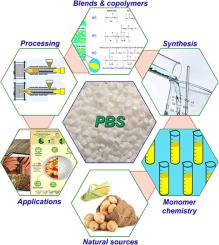Progress in Polymer Science ( IF 26.0 ) Pub Date : 2022-07-08 , DOI: 10.1016/j.progpolymsci.2022.101579 Massimiliano Barletta , Clizia Aversa , Muhammad Ayyoob , Annamaria Gisario , Kotiba Hamad , Mehrshad Mehrpouya , Henri Vahabi

|
The development of biodegradable and compostable materials as alternative to fossil-based plastics is today of paramount importance. Polybutylene succinate (PBS) is a class of biodegradable aliphatic polyester that can be achieved from succinic acid and 1,4 butanediol, which is of broad scientific and industrial interest among other biodegradable polyesters due to its compostability according to ISO EN13432 standard. PBS is considered one of the most interesting compostable polymers because of the good compromise of mechanical endurance, ductility, toughness and impact resistance. It is also characterized by a remarkable thermal resistance with heat deflection temperature (HDT) of over 90 °C. Nevertheless, due to its limited Young's modulus as well as its susceptibility to sudden degradation during melt processing, especially at high temperature, PBS is often blended and reinforced with other polymers, fillers and additives to tackle the issues of better processability, higher stiffness, and improved overall mechanical strength. Most common blends of PBS include poly(lactic acid) (PLA), another widespread compostable (and biobased) polyester, which is often added, in different proportion to PBS, to achieve tailored thermo-mechanical response behavior. Other additives and compatibilizers are also frequently used in PBS blends to achieve a wider processing window with better thermal resistance and better mechanical performance thanks to its customizable composition. Thus, recent advances in polymer blending processes have rendered PBS blends an interesting material platform for applications that require a balance of mechanical strength and flexibility as well as thermal resistance together with compliance to industrial compostability standards. This manuscript reviews briefly the synthesis routes of PBS together with the main thermo-mechanical and physical properties as well as recent progress in developing PBS-based blends for industrial applications. The challenges and future perspectives for the employment of PBS blends in every-day applications are also considered.
中文翻译:

聚丁二酸丁二醇酯 (PBS):材料、加工和工业应用
开发可生物降解和可堆肥材料作为化石塑料的替代品在今天至关重要。聚丁二酸丁二醇酯 (PBS) 是一类可生物降解的脂肪族聚酯,可由丁二酸和1,4 丁二醇制成,由于其符合 ISO EN13432 标准的可堆肥性,在其他可生物降解聚酯中具有广泛的科学和工业意义。PBS 被认为是最有趣的可堆肥聚合物之一,因为它可以很好地兼顾机械耐久性、延展性、韧性和抗冲击性。它还具有显着的耐热性,热变形温度 (HDT) 超过 90 °C。然而,由于其有限的杨氏模量以及在熔融加工过程中(尤其是在高温下)容易突然降解,PBS 经常与其他聚合物、填料和添加剂混合和增强,以解决更好的加工性能、更高的刚度和提高整体机械强度。最常见的 PBS 混合物包括聚乳酸 (PLA)、另一种广泛使用的可堆肥(和生物基)聚酯,通常以与 PBS 不同的比例添加,以实现定制的热机械响应行为。其他添加剂和增容剂也经常用于 PBS 混合物中,以实现更宽的加工窗口、更好的耐热性和更好的机械性能,这要归功于其可定制的成分。因此,聚合物共混工艺的最新进展使 PBS 共混物成为一个有趣的材料平台,适用于需要平衡机械强度和柔韧性以及耐热性以及符合工业可堆肥标准的应用。这份手稿简要回顾了 PBS 的合成路线以及主要的热机械和物理特性,以及开发用于工业应用的基于 PBS 的混合物的最新进展。还考虑了在日常应用中使用 PBS 混合物的挑战和未来前景。









































 京公网安备 11010802027423号
京公网安备 11010802027423号